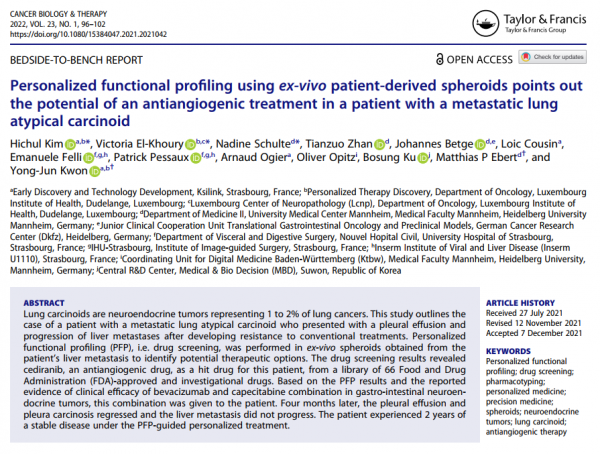Paper 2022, Cancer Biology, Personalized functional profiling using ex-vivo …
Page Info

Contents
ABSTRACT
Lung carcinoids are neuroendocrine tumors representing 1 to 2% of lung cancers. This study outlines the case of a patient with a metastatic lung atypical carcinoid who presented with a pleural effusion and progression of liver metastases after developing resistance to conventional treatments. Personalized functional profiling (PFP), i.e. drug screening, was performed in ex-vivo spheroids obtained from the patient’s liver metastasis to identify potential therapeutic options. The drug screening results revealed cediranib, an antiangiogenic drug, as a hit drug for this patient, from a library of 66 Food and Drug Administration (FDA)-approved and investigational drugs. Based on the PFP results and the reported evidence of clinical efficacy of bevacizumab and capecitabine combination in gastro-intestinal neuroendocrine tumors, this combination was given to the patient. Four months later, the pleural effusion and pleura carcinosis regressed and the liver metastasis did not progress. The patient experienced 2 years of a stable disease under the PFP-guided personalized treatment.
Lung carcinoids are neuroendocrine tumors representing 1 to 2% of lung cancers. This study outlines the case of a patient with a metastatic lung atypical carcinoid who presented with a pleural effusion and progression of liver metastases after developing resistance to conventional treatments. Personalized functional profiling (PFP), i.e. drug screening, was performed in ex-vivo spheroids obtained from the patient’s liver metastasis to identify potential therapeutic options. The drug screening results revealed cediranib, an antiangiogenic drug, as a hit drug for this patient, from a library of 66 Food and Drug Administration (FDA)-approved and investigational drugs. Based on the PFP results and the reported evidence of clinical efficacy of bevacizumab and capecitabine combination in gastro-intestinal neuroendocrine tumors, this combination was given to the patient. Four months later, the pleural effusion and pleura carcinosis regressed and the liver metastasis did not progress. The patient experienced 2 years of a stable disease under the PFP-guided personalized treatment.
Related Links
- Prev
 2022, International Journal of Molecular Sciences, Patient-Derived Tumor Organoids for Guidance of Personalized Drug Therapies in Recurrent Glioblastoma 23.05.22
2022, International Journal of Molecular Sciences, Patient-Derived Tumor Organoids for Guidance of Personalized Drug Therapies in Recurrent Glioblastoma 23.05.22 - Next
 2021, PLOS ONE, High-dose drug heat map analysis for drug safety and efficacy in multi-spheroid brain normal cells and GBM patient-derived cells 23.05.22
2021, PLOS ONE, High-dose drug heat map analysis for drug safety and efficacy in multi-spheroid brain normal cells and GBM patient-derived cells 23.05.22

